
Love birds: when zebra finches pair off with mates of their own choosing, they don’t lay more eggs – but the eggs are more likely to be fertilized.
Researchers from the Max Planck Institute show that behavioral compatibility plays an important role in mate choice in zebra finches.
Zebra finches allowed to breed with their preferred partner achieved a 37 percent higher reproductive success compared to pairs that were forced to mate. Researchers from the Max Planck Institute for Ornithology in Seewiesen observed a larger number of infertile eggs in such forced pairs. Moreover, pairs that resulted from free mate choice were more successful in rearing their young from hatching to independence.
An ideal mating partner may provide good genes for the offspring but may also enhance the number and quality of his offspring through being a good parent. However, within a given species there is often little agreement about who actually is the most attractive partner. Hence there are individual preferences that may reflect the need for compatibility of the partners’ behavior or genes. To date, it is largely unknown whether the suppression of such individualistic mate choice would result in fitness consequences.
Malika Ihle, Bart Kempenaers, and Wolfgang Forstmeier from the Max Planck Institute for Ornithology in Seewiesen designed an elegant experiment with zebra finches for a cost-benefit analysis of such individual “love marriages”. Zebra finches are socially monogamous, they typically form a life-long partnership, and they show intensive bi-parental care. The researchers started their experiment by allowing free mate choice among bachelor zebra finches that were maintained in large groups of peers. In doing so, they were able to exclude unpopular individuals that nobody wanted to mate with. Half of the newly paired couples were then split up and force-paired to the preferred partner of another bird, while the other half were allowed to continue with their chosen partner. Both types of pairs were first housed in separate one-pair cages for a few months to ensure that the assigned partners form a stable pairbond, before they were allowed to rear young in communal breeding aviaries.
Forced pairs and chosen pairs did not differ in how many eggs they laid, suggesting a similar initial reproductive investment in both groups. However, eggs of forced pairs were more likely to be unfertilized, buried underneath the nesting material, or simply disappeared. Moreover, after hatching, the rate of offspring mortality was higher in the nests of forced pairs. “The majority of the young died within the first 48 hours,” says Malika Ihle, first author of the study. During this period the father has the highest responsibility for caring for the brood. Interestingly, males trapped in a forced partnership showed a weaker nest attendance during these critical days.
With these results the researchers were able to show that behavioral compatibility plays an important role in mate choice. “In socially monogamous animals, the matching of partners may be particularly important in order to motivate each other and to coordinate and share the various tasks“, says Wolfgang Forstmeier.
The team analyzed more than 1700 hours of observation to find out how incompatibility is reflected in the behavior of the different pairs. While males were equally motivated to court their female partner, females in forced relationships were less willing to copulate with their assigned mate. An analysis of social behavior further revealed that partners of chosen pairs behaved more synchronously and stayed closer together than partners of forced pairs.
In conclusion, an individual’s opinion about who is the ideal partner should be taken seriously, because the compatibility of pair members can have important consequences, not only for the behavior as a pair, but ultimately for their biological fitness.
Reference: “Fitness Benefits of Mate Choice for Compatibility in a Socially Monogamous Species” by Malika Ihle, Bart Kempenaers and Wolfgang Forstmeier, 14 September 2015, PLOS Biology.
DOI: 10.1371/journal.pbio.1002248









Be the first to comment on "Free Mate Choice Enhances Reproductive Success"